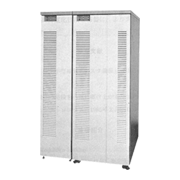In February 1984, NEC announced the N7756 compact, high-capacity disk unit using plated media. It was announced together with the ACOS System 430, and first shipped in September 1984.
Previously, the industry used coated media, in which magnetic powder was mixed into a coating compound, and coated onto the disk. But as recording densities increased, the required continuity and thinness of the magnetic film began to reach its limits. Therefore, when looking for next generation media, developers turned their attention to continuous thin-film media in which a continuous thin-film was formed using plating or sputtering technique. In 1982, NEC perfected and shipped magnetic disk units employing plated media, and this was the first such model for mainframes. The system achieved a recording density of 18,600dpi-at the time, the highest density in the world for a unit in practical use. This unit achieved a total memory capacity of 972MB in a small cabinet by providing two HDAs (Head Disk Assemblies), each comprised of ten 9-inch disk media.
NEC also commercialized the D2352 disk unit for OEM. The D2352 used the same HDA as this model, and had an unformatted memory capacity of 520MB.
| Memory capacity(MB) | 486 |
|---|---|
| Average seek time(msec) | 15 |
| Average rotational delay(msec) | 9.8 |
| Data transfer speed(MB/sec) | 1.9 |
| Disk diameter(inch) | 9 |
| Number of disks | 10 |
| Number of heads(information recording part) | 19 |
| Number of cylinders | 760 |
| Recording density(bpi) | 18600 |
| Track density(tpi) | 1000 |
| Recording system | 2-7RLL |
| Rotation speed(rpm) | 3070 |
| Total memory capacity(MB)(entire unit) | 972 |
| Unit dimensions(mm) (entire unit) | 500(W)×760(D)×1335(H) |


